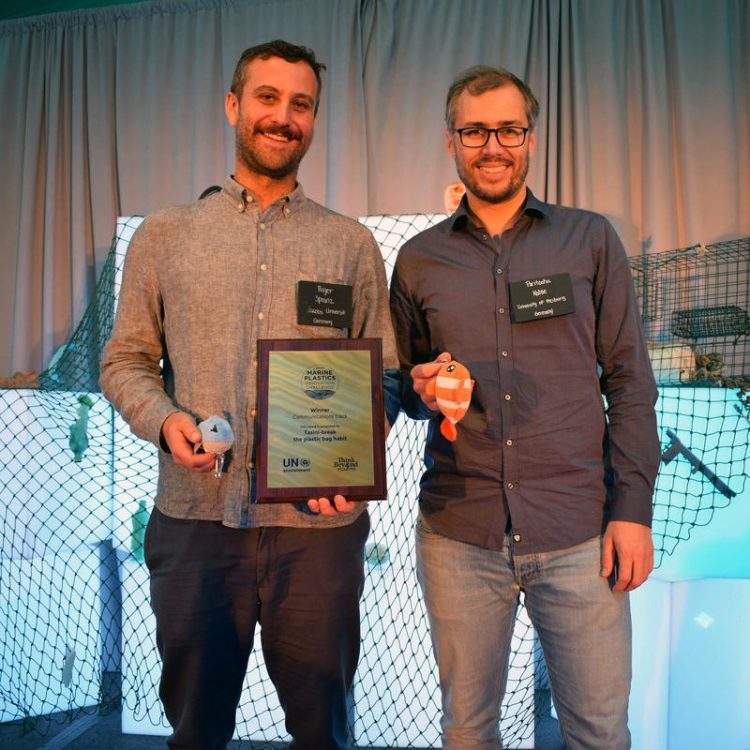Innovation Award of the United Nations Environment Programme for PhD Student from ZMT

Roger Spranz and colleague Paritosha Kobbe at the presentation of the Clean Seas Innovation Challenge Award in San Diego © Making Oceans Plastic Free
Roger Spranz, a former PhD student at the Leibniz Centre for Tropical Marine Research (ZMT), and his colleagues have been honoured with an innovation prize from the United Nations Environment Programme (UNEP) for the “Tasini” project. The jury of the “Clean Seas Innovation Challenge”, a competition that recognises students worldwide for original solutions to the problem of marine litter, chose the Tasini project together with three further proposals from a total of 200 submitted entries.
The award was presented recently at the International Marine Debris Conference in San Diego, USA.
Indonesia counts among one of the biggest contributors to the problem of plastic waste in the oceans. Around 10 million plastic bags are used in the country every day. Three years ago, social scientist Roger Spranz from ZMT started a research project in Bali for his doctoral thesis. His work examined incentives that can be used to encourage people to use fewer plastic bags.
Spranz and his colleagues came up with the idea of “Tasini”, reusable shopping bags made from recycled plastic waste and designed in the shape of sea animals. The little turtles, octopus, sharks and rays are not only a fashion accessory but serve as environmental ambassadors raising awareness of the marine litter issue. The foldable bags can be attached to a key ring and replace up to 400 plastic bags a year – a fun way to protect the environment!
The production of “Tasini” bags with high environmental and social standards has now started in Indonesia. “We were able to reduce production costs and thus to reach even more people,” reports Roger Spranz. Part of the project is a large-scale information campaign on the subject of marine litter.
“We are currently developing entertaining and educational cartoon films with Tasini characters and a Tasini game app,” says Spranz. “We have also had great interest in Europe and are currently considering how we can use Tasini most effectively in Germany to reduce the number plastic bags used.”
According to UNEP, eight million tons of plastic enter the oceans every year – calculated per minute this is as much as a full garbage truck can transport. This plastic waste threatens the lives of countless fish and other marine animals, can disturb entire marine and coastal ecosystems and end up in the food chain.
UNEP launched the “Clean Seas” campaign at the beginning of 2017 to address the problem. “The winners of the “Clean Seas” competition have shown great creativity in proposing solutions to one of the most pressing environmental problems of our time,” said Executive Director Erik Solheim in a UNEP press release.
Further information…
…on the project “Tasini”
https://makingoceansplasticfree.com/
…on the UN Environment Programme Innovation Award
https://www.unenvironment.org/news-and-stories/press-release/cleanseas-innovatio…
Contact
ideas@makingoceansplasticfree.com
Dr. Roger Spranz (Indonesia)
+6281296663733
https://makingoceansplasticfree.com/
https://www.unenvironment.org/news-and-stories/press-release/cleanseas-innovatio…
Media Contact
All latest news from the category: Awards Funding
Newest articles

Silicon Carbide Innovation Alliance to drive industrial-scale semiconductor work
Known for its ability to withstand extreme environments and high voltages, silicon carbide (SiC) is a semiconducting material made up of silicon and carbon atoms arranged into crystals that is…

New SPECT/CT technique shows impressive biomarker identification
…offers increased access for prostate cancer patients. A novel SPECT/CT acquisition method can accurately detect radiopharmaceutical biodistribution in a convenient manner for prostate cancer patients, opening the door for more…

How 3D printers can give robots a soft touch
Soft skin coverings and touch sensors have emerged as a promising feature for robots that are both safer and more intuitive for human interaction, but they are expensive and difficult…





















